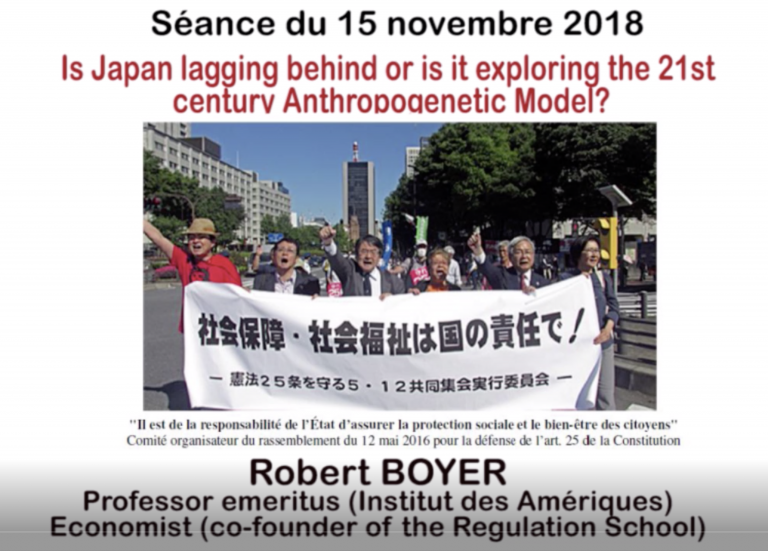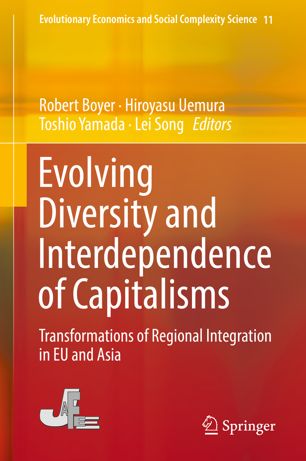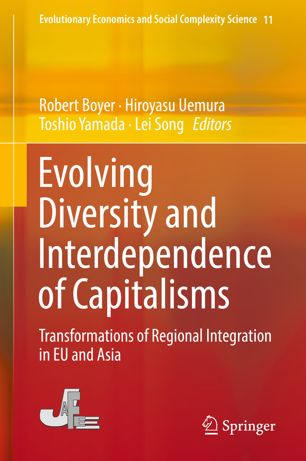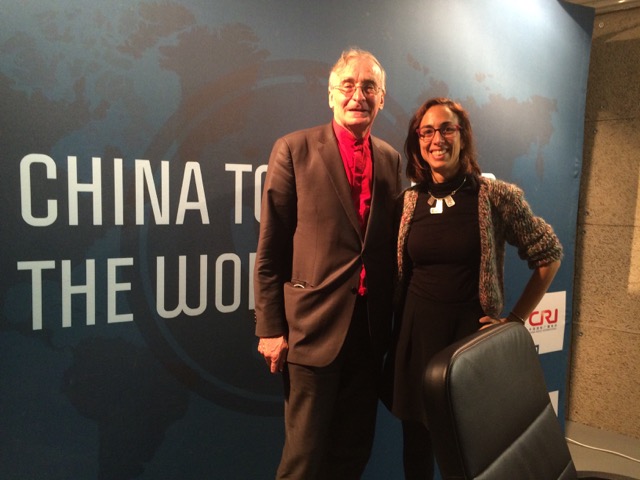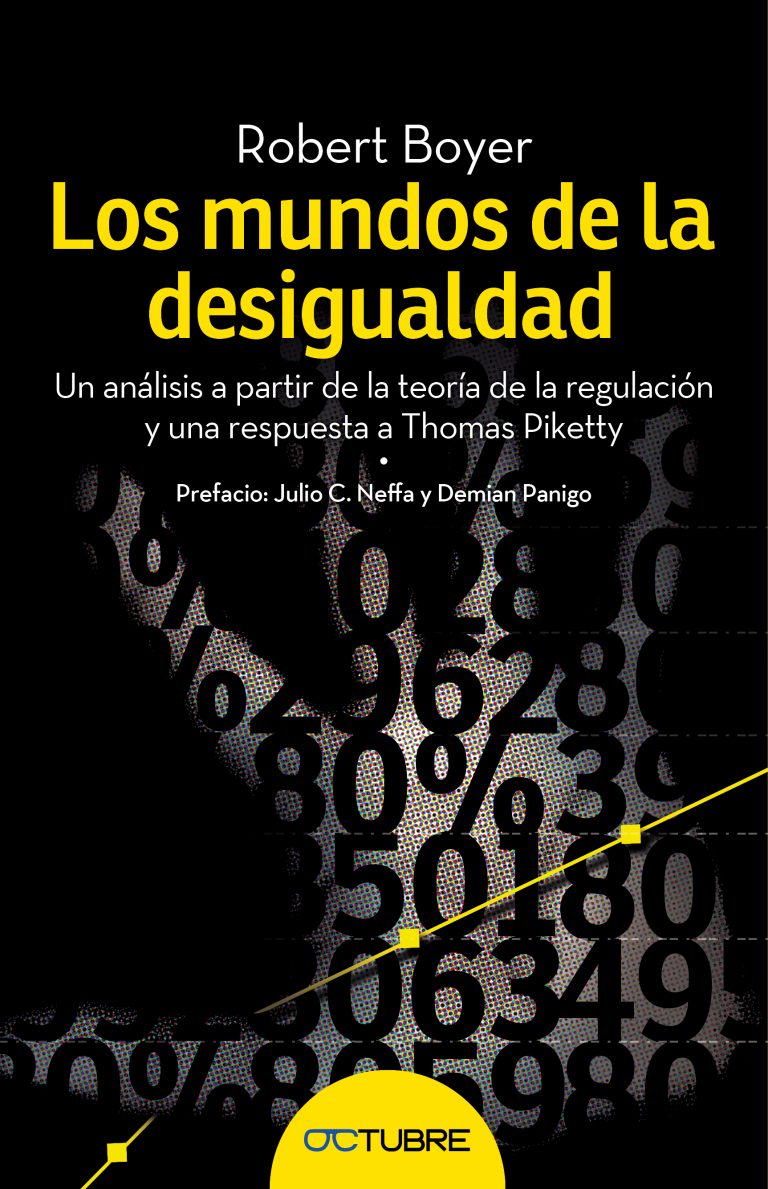Alternatives Economiques, Entreprises+, Opinion, paru le 10 novembre 2023
Conferencia magistral en el marco del seminario de economia social 2021 en el tiempos de la Covid-19, Camara de disputados, UAM Marzo 22 de 2021
El CESOP presentó el libro “Los capitalismos a la prueba de la pandemia”, de Robert Boyer
🔴 EN VIVO / Conferencia Magistral “Los capitalismos a la prueba de la pandemia” – YouTube , 22 de Marzo 2021. (En Espanol)
• El Centro es vínculo permanente para difundir el conocimiento científico: Netzahualcóyotl Vázquez Vargas
Boletín No. 6144
• El autor impartió una conferencia magistral donde planteó los retos sociales, en salud, economía y gobernanza
El Centro de Estudios Sociales y de Opinión Pública (CESOP) de la Cámara de Diputados, presentó el libro “Los capitalismos a la prueba de la pandemia”, de Robert Boyer, investigador del Institut des Amériques, Paris, Francia, quien impartió una conferencia magistral para dar a conocer sus consideraciones ante los retos de la emergencia sanitaria a nivel de salud, social, economía y gobernanza.
En el marco del Seminario de Economía Social 2021 en Tiempos de la Covid-19, el evento fue convocado en coordinación con la Universidad Autónoma Metropolitana (UAM)-Iztapalapa, el Centro de Investigaciones Socioeconómicas de la Universidad Autónoma de Coahuila y la Cámara Nacional de la Industria de Transformación (Canacintra).
A través de plataforma electrónica, Netzahualcóyotl Vázquez Vargas, encargado de la Dirección General del CESOP, destacó la primicia de la exhibición en la Cámara de Diputados de la obra a nivel internacional.
Resaltó que el CESOP es un vínculo permanente en la difusión del conocimiento científico, en particular de este libro para conocer sus aportaciones y el impacto de la pandemia en la dinámica económica y social.
Refirió que la economía mundial venía mostrando transformaciones y rezagos previos a la pandemia en áreas como competitividad salarial, inversión física y financiera en sectores dinámicos; constitución de nuevos conglomerados financieros regionales e interacciones empresa-gobierno, así como una reconfiguración global en su modelo de acumulación, por lo que con la publicación de esta obra será muy interesante conocer el impacto de la emergencia sanitaria, en esta y otras áreas de la dinámica económica.
Juan Manuel Herrera Caballero, director de la División de Ciencias Sociales y Humanidades de la UAM-Iztapalapa, resaltó la importancia de la temática del libro que mueve a la humanidad, cuya preocupación se muestra en diferentes vertientes ante la contingencia sanitaria, donde el trabajo académico y la operación de la industria continúan presentes frente a los problemas de las sociedades.
Esta obra, dijo, no sólo es un planteamiento, sino una contribución colectiva que nos va a dejar muchas tareas más allá de las reflexiones.
Conferencia magistral
Robert Boyer destacó que la pandemia es una crisis sin precedente histórico porque se presenta en todo el mundo y exige soluciones globales; no tiene relación ni similitud con las de 1929 ni con la de 2008, porque “aún no sabemos cómo salir de ella”. Dijo que se requiere utilizar mecanismos y soluciones diferentes y destacó la necesidad de un cambio en la gobernanza, porque la incertidumbre radical del virus desestabiliza a expertos y gobiernos.
Subrayó que la pandemia rehabilitó el papel del Estado, de empresarios y asalariados, colocando a la salud en una prioridad en medio de la globalización, ya que con la pandemia no hay ningún desarrollo si no hay seguridad sanitaria, lo que alentó el regreso del Estado a tomar el riesgo económico e invertir en la investigación científica.
El experto francés planteó un cambio radical para garantizar los servicios médicos y abrir las empresas, donde el Estado invierta en alternativas de salud para solucionar la apertura y recuperar la estabilidad económica y financiera mediante un sistema centrado en la salud, educación, capacitación, cultura, en el sentido de la legitimación del orden social y económico.
“La solución a la crisis no son los productos financieros sofisticados, sino encontrar vacunas nuevas y que todos los países tengan acceso a ellas”, porque los más pobres no lo logran, evidenciando un modelo excluyente y desigual a la salud, en una variante neoliberal, donde los ricos prosperan y los pobres se rezagan. A diferencia de la crisis financiera de 2008, en la pandemia de 2020 los gobiernos no tuvieron herramientas para organizar el sistema público de salud.
Robert Boyer apuntó que se deben “sincronizar los avances en salud y la recuperación económica” porque las decisiones iniciales de los Estados, en general, fueron muy equivocadas y nadie ha encontrado una buena solución, al considerar que con el confinamiento hay una restricción de las libertades, no obstante que esta medida ha preservado la salud y vida de la población.
Afirmó que se desarrolló de forma increíble el nuevo capitalismo de la información tecnológica a nivel mundial, a raíz del distanciamiento de las personas, debilitándose el antiguo capitalismo. “El capitalismo digital muestra todo su poder” a través del comercio electrónico mundial, donde las grandes empresas tienen gran control sobre la sociedad y la economía por su infraestructura tecnológica y electrónica.
La velocidad de la transformación de la economía digital los empleos no se quedarán estáticos, se requerirá de constante actualización y capacitación, privilegiando la educación. También, previó que se requerirá un nuevo esquema fiscal para desarrollar el nuevo modelo económico-tecnológico.
Señaló entre los retos por la crisis sanitaria está el detener el desempleo, luchar contra la pobreza y desigualdad, garantizar la salud y preservar el medio ambiente.
Al comentar la obra, Alenka Guzmán, profesora investigadora de la UAM-Iztapalapa, refirió que a través de nueve capítulos se expone el análisis de “un evento desconcertante porque el virus SARS-CoV-2 aparece como algo desconocido”. Evidencia que se está en el espacio descubriendo otros planetas; sin embargo, en el planeta se descuida profundizar en los problemas que existentes en este mundo.
Planteó la prioridad de que los países repiensen la forma en que se organiza el sistema para dar prioridad a la salud enlazada con la economía y la libertad de las personas, porque la emergencia sanitaria detiene la economía, donde los gobiernos, al principio se tratan de mimetizar y adoptar medidas similares como el confinamiento, que significa detener la economía revelando los rezagos sociales y económicos existentes en los países.
La obra dijo, muestra el retorno del Estado para enfrentar la crisis sanitaria y reivindica los ejes centrales de la teoría de la regulación. Además, diferencia la naturaleza de las crisis financieras anteriores a la pandemia y muestra cómo la han atendido los diferentes capitalismos, de acuerdo a su desarrollo y posibilidades.
A su vez, Miguel Ángel Toro Hernández, presidente de la Comisión de Enlace Legislativo de la Canacintra, señaló la falta de protocolos de cooperación y coordinación internacional de México con Estados Unidos, Canadá, Unión Europea y Asia Pacífico, para paliar los efectos negativos del cierre de la planta productiva y pérdida de empleos.
Comentó que la pandemia ha puesto a prueba a todos los sectores, enfocando el esfuerzo en las áreas esenciales; no obstante, no se trabajó de forma coordinada para sincronizar las decisiones y acciones en favor de las cadenas productivas, sin demeritar el abasto de bienes.
Gilberto Aboites Manríquez, doctor en ciencias sociales de la Universidad Autónoma de Guadalajara, destacó que la globalización ha permitido tener respuestas a gran velocidad a través de las aportaciones de las instituciones de investigación de diversos países, dejado atrás la secrecía y propiedad intelectual que permitió, de una forma inesperada, dar respuesta con la vacuna, privilegiando las relaciones de los científicos por un fin común.
Esta tendencia no la siguieron los Estados Nación, cuyo papel y legitimidad es cuestionable porque no tuvieron capacidad para reaccionar de forma inmediata y construir nuevas formas de relación social con los ciudadanos. La pandemia ha generado una caída generalizada en el consumo privado, provocando un incremento del ahorro, ¿Cuáles son las formas o instrumentos para gestionar este ahorro?, es un tema relevante para los economistas, consideró.
Présentation au séminaire de master « sciences sociales du Japon », 15 novembre 2018
– Lien vers le séminaire (Robert Boyer)
Robert Boyer, Hiroyasu Uemura, Toshio Yamada, Lei Song, in Boyer Robert, Toshio Yamada, and Lei Song (Eds), Evolving Diversity and Interdependence of Capitalisms. Transformations of Regional Integration in EU and Asia, book series (EESCS, volume 11), Springer, Japan KK, part of Springer Nature 2018, p. 459-483.
in Boyer Robert, Toshio Yamada, and Lei Song (Eds), Evolving Diversity and Interdependence of Capitalisms. Transformations of Regional Integration in EU and Asia, book series (EESCS, volume 11), Springer, Japan KK, part of Springer Nature 2018, p. 259-302
in Boyer Robert, Toshio Yamada, and Lei Song (Eds), Evolving Diversity and Interdependence of Capitalisms. Transformations of Regional Integration in EU and Asia, book series (EESCS, volume 11), Springer, Japan KK, part of Springer Nature 2018, p. 17-64
Boyer Robert, Toshio Yamada, and Lei Song (Eds), Book, Part of the Evolutionary Economics and Social Complexity Science book series (EESCS, volume 11), Springer, Japan KK, part of Springer Nature 2018
Introduction
This book integrates three levels of political–economic analysis: first a comparative institutional analysis of the varieties of capitalism in both Europe and Asia, second a macroeconomic analysis of industrial structural change and economic dynamics of the national economies in Europe and Asia, and then an encompassing analysis of international production linkages and international financial instability which determine the long-term patterns of regional integration in Europe and Asia. The comparison of the European Union and ASEAN delivers some key conditions for a viable long-term regional economic integration to cope with contrasted capitalisms and growth regimes: either pragmatism in the choice of an exchange rate regime, or a form of fiscal federalism. The reader will also find a genuine analysis of the dynamism of the Chinese economy, a study on institutional changes and de-industrialization in Japan, and the increasing international production linkages among China, Japan, Korea, and ASEAN. It is shown how the enlargement of the European Union and the Euro triggered the diverging competitiveness and macroeconomic performances that led to the crisis of a six decades long economic and political process. This book is the result of long lasting Asian–European collaborative research. It is a milestone in the historical and comparative analysis along the régulation theory that aims at understanding the long-run transformations, renewed diversity and interdependence of capitalisms.
Cet ouvrage qui résulte d’un travail collaboratif et de plus de vingt ans de recherche. Ce livre sort en français en 2015* afin de comprendre les différentes formes de capitalismes asiatiques. Les spécificités de chacun des capitalismes d’Asie sont expliquées grâce à la théorie de la régulation. De la Chine au Japon en passant par la Corée, la seule façon de comprendre chacun de ces modèles capitalistiques est d’en analyser les moments de crise, de rupture (selon la théorie de la régulation).
Pour la Chine une attention particulière est portée à la difficulté à rendre opérationnelle au niveau local la politique économique concurrentielle mise en œuvre par l’État central.
Pour en parler dans nos studios, Robert Boyer, co-auteur de ce livre, ancien directeur de recherche au CNRS et chef de file de la Théorie de la régulation en France. Un ouvrage qui s’adresse plutôt aux économistes et aux chercheurs mais que les néophytes pourront également apprécier grâce à cet échange « radiophonique ».
* éditions Presses Universitaires de Rennes
Editorial Octubre, Buenos Aires, 2014.
Prefacio: Julio C. Neffa y Demian Panigo,
Traduccion: Irene Brousse, Patricia Brousse y Julio C. Neffa.
La desigualdad es el tema de la hora. Parece haber dejado de ser algo que solo interesaba a sociólogos y cientistas políticos, y en los últimos tiempos irrumpió en el gran escenario de la mano de tres hechos relevantes: el discurso de Barack Obama sobre el Estado de la Unión en 2013; la conferencia pronunciada en octubre de 2014 por Janet Yellen, la presidenta del Sistema de la Reserva Federal; y la aparición del libro de Thomas Piketty, El capital en el siglo XXI, ya convertido en un best seller a nivel mundial.
Para Robert Boyer, quizás el principal animador de la escuela de la regulación, el enfoque de Piketty es extremadamente rico pero está lejos de ser convincente. Y en Los mundos de la desigualdad demuestra que no está a la altura del análisis histórico de largo plazo que realiza, que no es evidente que ese mecanismo genérico explique la configuración de las economías basadas en un compromiso industrialista y, finalmente, que la solución que propone no es realista.
Según el autor, la cuestión de las desigualdades debe partir de la especificidad del contexto nacional en un período histórico. Y por lo tanto abre un espacio para la acción política, creadora de modos de desarrollo contrastados. A pesar de la mundialización y de una interdependencia creciente de las economías nacionales, lo que Boyer nos viene a decir es que la profundización de las desigualdades no tiene por qué ser un destino ineludible.


